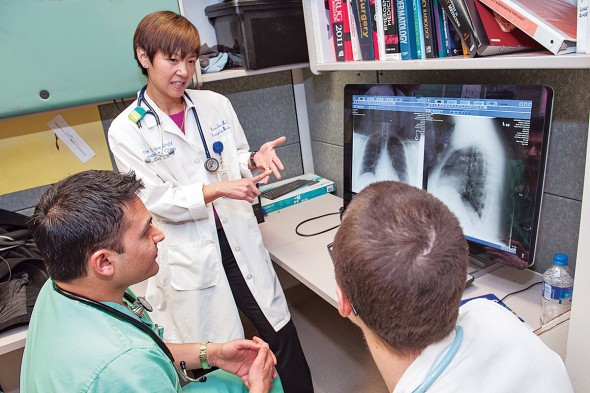Overseas and at home, partnerships are key

College of Medicine faculty member Janet Lin travels the globe to provide health care in countries such as Haiti and Uganda. Photo: Roberta Dupuis-Devlin/UIC Photo Services
Each year, UIC honors some of its most dedicated and outstanding teachers with the Award for Excellence in Teaching. The winners, who receive a $5,000 salary increase, are selected by past recipients.
“Partnerships are paramount to success,” says Janet Lin.
Whether those partnerships are with her students, or the communities in Haiti and Uganda where she works to improve health care, Lin looks for ways to empower those around her.
Lin has many roles at UIC: associate professor of emergency medicine, with an affiliate appointment in community health sciences in the School of Public Health; director of health systems development in the Center for Global Health and developer of several core courses in Public Health’s Global Health Program; core faculty in the new Global Medicine program in the College of Medicine; head of the international emergency medicine fellowship program, which trains postgraduate physicians for practice and research in international settings.
Lin has combined a lifelong interest in travel with a career in international global medicine.
“I have a strong passion in improving health care in resource-limited settings,” she says.
This passion took her to Haiti two weeks after the 2010 earthquake as an immediate emergency responder with a group from UIC. She has been going back ever since.
“I felt it was important to provide immediate aid, but also to return to find ways to improve disaster preparedness,” Lin says.
Recently, she and an interdisciplinary group of students partnered with community members to identify risks that could affect health care delivery in the event of another disaster.
In Uganda, Lin is developing programs to support volunteer health workers in a rural clinic.
In the global health courses she teaches to public health and medical students, “what is most important to me as a teacher is equipping my students to become critical thinkers so that they can solve problems.”
Lin’s research on her home turf at UIC is also related to improving health care access and delivery.
She is focused on improving rates of HIV screening in the emergency room by switching to a testing protocol where patients must opt out of being screened instead of opting in.
“Doing more HIV screening can help reduce the transmission of the virus because if more people know they have HIV, they can take steps to prevent infecting others,” Lin says.
“So many people don’t know they carry HIV, which is one of the drivers behind its spread.”
Categories
Topics
Award for Excellence in Teaching, awards, Emergency medicine, global health, Haiti, teaching, teaching excellence
